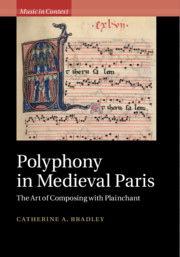Book contents
- Polyphony in Medieval Paris
- Music in Context
- Polyphony in Medieval Paris
- Copyright page
- Contents
- Figures
- Musical Examples
- Tables
- Acknowledgements
- Note on the Text
- Manuscript Sigla
- Abbreviations
- Introduction
- 1 Plainchant in Polyphony: The Gradual Propter veritatem in Organa, Clausulae, and Motets
- 2 Mini Clausulae and the Magnus liber organi
- 3 Texting Clausulae: Repetition and Regularity on the REGNAT Tenor
- 4 Transcribing Motets: Vernacular Refrain Melodies in Magnus liber Clausulae
- 5 Framing Motets: Quoting and Crafting Refrains against Plainchant Tenors
- 6 Intertextuality, Song, and Female Voices in Motets on a St Elizabeth of Hungary Tenor
- 7 From Florence to Fauvel: Rereading Musical Paradigms through a Long-Lived IOHANNE Motet
- 8 Conclusions
- Bibliography
- Index of Compositions
- General Index
7 - From Florence to Fauvel: Rereading Musical Paradigms through a Long-Lived IOHANNE Motet
Published online by Cambridge University Press: 27 July 2018
- Polyphony in Medieval Paris
- Music in Context
- Polyphony in Medieval Paris
- Copyright page
- Contents
- Figures
- Musical Examples
- Tables
- Acknowledgements
- Note on the Text
- Manuscript Sigla
- Abbreviations
- Introduction
- 1 Plainchant in Polyphony: The Gradual Propter veritatem in Organa, Clausulae, and Motets
- 2 Mini Clausulae and the Magnus liber organi
- 3 Texting Clausulae: Repetition and Regularity on the REGNAT Tenor
- 4 Transcribing Motets: Vernacular Refrain Melodies in Magnus liber Clausulae
- 5 Framing Motets: Quoting and Crafting Refrains against Plainchant Tenors
- 6 Intertextuality, Song, and Female Voices in Motets on a St Elizabeth of Hungary Tenor
- 7 From Florence to Fauvel: Rereading Musical Paradigms through a Long-Lived IOHANNE Motet
- 8 Conclusions
- Bibliography
- Index of Compositions
- General Index
Summary
Information
- Type
- Chapter
- Information
- Polyphony in Medieval ParisThe Art of Composing with Plainchant, pp. 212 - 246Publisher: Cambridge University PressPrint publication year: 2018
